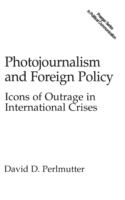
Photojournalism and Foreign Policy
ISBN-10: 0275963624
ISBN-13: 9780275963620
$35.00
Book Specs
Trade Paper
Praeger
Published on
Oct 23, 1998
Edition
st Edition
Dimensions
6.14x0.50x9.21 Inches
Weight
0.67 Pounds
About the Book
David Perlmutter examines concerns over the interplay of pictures in the press, elite decision-making and public opinion on foreign policy. His focus is on certain celebrated, indelible images that, it is said, sum up famous events, provoke moral outrage, mobilize public opinion, and spur government action: the icons of outrage. Discourse elites thrust greatness upon such images as well as frame their meaning and interpretation. The public only plays a marginal role in making icons; ordinary readers and viewers are, however, often resistant or indifferent to elite interpretation and pretensions of outrage.
To explore these ideas, Professor Perlmutter offers a series of case studies in crises in American foreign policy and the images that came to define and affect them: the Tet offensive in 1968, the Tiananmen events of 1989, and the Somalia intervention of 1992-1994. In each case, icons became sites of political struggle and argumentation, tools of policy rather than masters of it. Actual effects on public opinion are rarely found. Presidents, diplomats, pundits, and journalists, when confronting news images, apply a first person effect, projecting onto all of America or even the whole world their personal reaction to an icon. As Perlmutter shows, the influence of icons of outrage lies in their ability to focus debate, not in any power of visual determinism. He concludes that rather than worrying about how pictures affect policy, more attention should be paid to how politicians manage, frame, and spin images to win support for policies. A provocative study for students, scholars, and the public concerned with visual communication, the mass media, and current international affairs.
